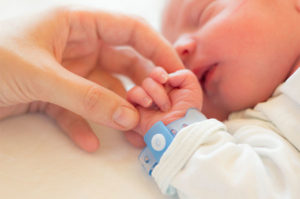Compensation for Birth Injuries Caused by Medical Negligence
You may be eligible for financial compensation if you believe your child has a birth injury caused by medical negligence.
Birth negligence compensation can help your family pay for your child’s treatment to help them live an independent life. Working with a medical malpractice attorney at an experienced law firm can help your family get compensation.
IS YOUR CHILD MISSING DEVELOPMENTAL MILESTONES?
Take Our Milestones Quiz
Taking note of your child’s physical, social, and emotional skills can help you determine if they potentially suffered from an injury at birth. An early diagnosis can help your child get the treatment they need as soon as possible.
Q1: How old is your child?
0-2 MONTHS DEVELOPMENTAL MILESTONES QUIZ
- Q2: Can your child hold their head steadily on their own?
- Q3: Can your child push themselves up when they are lying on their stomach?
- Q4: Has your child started to make smoother movements with their arms and legs?
- Q5: Does your child smile at other people?
- Q6: Can your child bring their hands to their mouth?
- Q7: Does your child turn their head when they hear a noise?
- Q8: Does your child coo or make gurgling noises?
- Q9: Does your child follow things with their eyes?
- Q10: Does your child try to look at their parents or caregivers?
- Q11: Does your child show boredom, cry, or fuss when engaged in an activity that hasn’t changed in a while?

3-4 MONTHS DEVELOPMENTAL MILESTONES QUIZ
- Q2: Can your child hold their head steadily on their own?
- Q3: Does your child push down on their legs when their feet are on a flat surface?
- Q4: Has your child started to roll over from their stomach to their back?
- Q5: Can your child hold and shake a toy such as a rattle?
- Q6: Does your child bring their hands to their mouth?
- Q7: Does your child play with people and start to cry when the playing stops?
- Q8: Does your child smile spontaneously, especially at people?
- Q9: Does your child copy some movements and facial expressions of other people?
- Q10: Does your child babble with expressions and copy sounds they hear?
- Q11: Does your child cry in different ways to show hunger, pain, or tiredness?
- Q12: Does your child respond to affection like hugging or kissing?
- Q13: Does your child follow moving things with their eyes from side to side?
- Q14: Does your child recognize familiar people at a distance?

5-6 MONTHS DEVELOPMENTAL MILESTONES QUIZ
- Q2: Can your child roll over on both sides (front to back/back to front)?
- Q3: Has your child begun to sit without support?
- Q4: Does your child rock back and forth?
- Q5: Can your child support their weight on their legs (and perhaps bounce) when standing?
- Q6: Has your child begun to pass things from one hand to the other?
- Q7: Does your child bring objects such as toys to their mouth?
- Q8: Does your child know if someone is not familiar to them and is a stranger?
- Q9: Does your child respond to other people’s emotions, such as a smile or a frown?
- Q10: Does your child enjoy looking at themselves in the mirror?
- Q11: Does your child look at things around them?
- Q12: Does your child respond to sounds they hear by making sounds themselves?
- Q13: Does your child make sounds to show joy or displeasure?
- Q14: Does your child respond to their own name?
- Q15: Has your child started to string vowels together, such as "ah," "eh," or "oh," or started to say consonant sounds such as "m" or "b"?
- Q16: Has your child begun to laugh?

7-9 MONTHS DEVELOPMENTAL MILESTONES QUIZ
- Q2: Can your child crawl?
- Q3: Can your child stand while holding on to something to support them?
- Q4: Can your child sit without support?
- Q5: Can your child pull themselves up to stand?
- Q6: Does your child play peekaboo?
- Q7: Can your child move things from one hand to the other?
- Q8: Can your child pick small things up, such as a piece of cereal, with their thumb and index finger?
- Q9: Does your child look for things that they see you hide?
- Q10: Does your child watch the path of something as it falls?
- Q11: Does your child show fear when around strangers?
- Q12: Does your child become clingy with adults who are familiar to them?
- Q13: Does your child have favorite toys?
- Q14: Does your child use their fingers to point?
- Q15: Does your child understand “no”?
- Q16: Does your child make a lot of repetitive sounds, such as “mamama” or “bababa”?
- Q17: Does your child copy the sounds and gestures of other people?

10-12 MONTHS DEVELOPMENTAL MILESTONES QUIZ
- Q2: Can your child stand alone with no support?
- Q3: Does your child walk while holding on to furniture?
- Q4: Can your child take a few steps without holding on to anything?
- Q5: Can your child get into a sitting position without any help?
- Q6: Does your child bang two things together when playing?
- Q7: Does your child poke with their index finger?
- Q8: Has your child started to use things like hairbrushes or drinking cups correctly?
- Q9: Does your child find hidden objects easily?
- Q10: Does your child play peekaboo or pat-a-cake?
- Q11: Does your child become shy or nervous around strangers?
- Q12: Does your child repeat actions or sounds to get attention?
- Q13: Does your child put out an arm or leg to help when getting dressed?
- Q14: Does your child cry when a parent leaves the room?
- Q15: Does your child show that they have favorite things or people?
- Q16: Does your child show fear?
- Q17: Does your child say things such as “mama,” “dada,” or “uh-oh”?
- Q18: Does your child try to say the words you say?
- Q19: Has your child started to use gestures like waving or shaking their head “no”?

13-18 MONTHS DEVELOPMENTAL MILESTONES QUIZ
- Q2: Can your child walk by themselves?
- Q3: Does your child walk up stairs and run?
- Q4: Does your child pull toys while walking?
- Q5: Can your child drink from a cup on their own?
- Q6: Can your child eat with a spoon on their own?
- Q7: Can your child help undress themselves?
- Q8: Does your child have occasional temper tantrums?
- Q9: Does your child show affection to familiar people?
- Q10: Does your child become clingy in new situations?
- Q11: Does your child explore their environment alone with parents close by?
- Q12: Can your child say several single words?
- Q13: Can your child say and shake their head “no”?
- Q14: Does your child point to show things to other people?
- Q15: Does your child scribble?
- Q16: Does your child know what ordinary products such as phones, spoons, and brushes are used for?
- Q17: Can your child follow one-step commands such as “sit down” or “stand up”?
- Q18: Does your child play with a doll or stuffed animal by pretending to feed it?

19-23 MONTHS DEVELOPMENTAL MILESTONES QUIZ
- Q2: Has your child begun to run?
- Q3: Has your child kicked a ball?
- Q4: Can your child climb down and onto furniture on their own?
- Q5: Can your child walk up and down stairs while holding on?
- Q6: Can your child stand on their tiptoes?
- Q7: Has your child thrown a ball overhand?
- Q8: Does your child copy others, especially people older than them?
- Q9: Does your child get excited around other children?
- Q10: Has your child shown more independence as they've aged?
- Q11: Does your child do what they were told not to do and become defiant?
- Q12: Does your child point to things when they are named?
- Q13: Does your child know names of familiar people or body parts?
- Q14: Does your child say 2 to 4-word sentences?
- Q15: Does your child repeat words they hear?
- Q16: Does your child complete sentences and rhymes in familiar books?
- Q17: Does your child name items in books, such as dogs, cats, and birds?
- Q18: Does your child play simple pretend games?
- Q19: Has your child started to use one hand more than the other?
- Q20: Has your child begun to sort shapes and colors?
- Q21: Does your child follow 2-step instructions, such as “pick up your hat and put it on your head?”

24+ MONTHS DEVELOPMENTAL MILESTONES QUIZ
- Q2: Can your child run easily?
- Q3: Can your child climb?
- Q4: Can your child walk up and down stairs with one foot on each step?
- Q5: Can your child dress and undress themselves?
- Q6: Does your child show affection for friends without being told?
- Q7: Does your child take turns when playing games?
- Q8: Does your child show concern when others are crying?
- Q9: Does your child understand the idea of “mine" and "theirs"?
- Q10: Does your child show many different emotions?
- Q11: Does your child copy adults and friends?
- Q12: Does your child separate easily from their parents?
- Q13: Does your child get upset when there is a major change in their routine?
- Q14: Does your child say words such as “I,” “me,” “we,” “you,” and some plural nouns?
- Q15: Can your child say their first name, age, and gender?
- Q16: Can your child carry on a conversation with 2 to 3 sentences?
- Q17: Can your child work toys with buttons and other moving parts?
- Q18: Does your child play pretend with dolls, animals, or people?
- Q19: Can your child finish 3 or 4 piece puzzles?
- Q20: Can your child copy a circle when drawing?
- Q21: Can your child turn pages of a book one page at a time?
- Q22: Can your child turn door handles?

What Is Medical Negligence During Childbirth?
Medical negligence occurs when medical professionals fail to uphold a high standard of medical care, resulting in injury or death to the patient. The standard of care refers to an appropriate level of caution, consideration, and good judgment that should be exercised by medical professionals in various situations.
pregnant women in the U.S. experienced pregnancy and childbirth complications.
According to Blue Cross Blue Shield
Medical professionals are expected to navigate difficult birthing situations and provide prompt medical treatment. For example, doctors may need to act quickly during emergency situations when a mother or baby is in immediate danger.
Failing to act quickly during an emergency can be considered medical negligence. Unfortunately, these complications can cause long-term or even permanent harm to babies or their mothers.
Birth Injuries Caused By Medical Negligence
Medical Negligence During Pregnancy

Medical negligence during pregnancy often involves a failure to diagnose conditions in the baby or the mother.
Obstetricians must properly screen the mother during pregnancy for high-risk conditions, such as preeclampsia, diabetes, and maternal infection, to help ensure a safe childbirth.
Failure to treat these conditions can cause the mother serious harm, such as liver failure, heart issues, or seizures during pregnancy and delivery. Additionally, this can lead to childbirth complications resulting in a permanent brain injury to the baby.
Medical Negligence During Birth
There are several instances of medical negligence at birth during a difficult or complicated delivery.
Forms of medical negligence during childbirth that may lead to birth injuries include:
- Exerting too much force to pull or twist a baby during delivery
- Failure to prevent and control tearing/hemorrhaging in the mother
- Failure to monitor the baby’s heartbeat and detect fetal distress
- Failure to perform an emergency cesarean section (C-section) when necessary
- Misuse of birthing tools during a vacuum or forceps delivery
Failing to inform a mother about the risks of using forceps or vacuum delivery can also be considered medical negligence.
Medical Negligence After Birth

Medical negligence at birth can still occur after the child has been delivered. Failure to control blood loss, monitor the baby’s oxygen levels, examine the baby for jaundice, or test the mother and baby for blood type incompatibility are considered medical negligence.
Doctors must also immediately diagnose and treat postpartum uterine ruptures and tears in the mother to prevent infection and long-term medical issues.
Effects of Medical Negligence
There are many short-term and long-term effects stemming from medical negligence birth trauma for both the mother and baby.
Short-Term Effects for the Mother and Baby
Medical negligence at birth can result in several immediate issues to the baby including:
- Bleeding in the skull or under the scalp (hematoma)
- Blood pressure that is too high or too low
- Bone fractures
- Infection
- Neonatal asphyxia
- Neonatal jaundice
- Nerve damage
- Swelling and bruising
Serious short-term effects of medical negligence birth trauma for mothers include:
- Blood loss
- Dangerously high or low blood pressure
- Injury to uterus, bladder, or bowel
- Lack of control over urination
- Severe vaginal or uterine tears
Doctors can treat many of these short-term effects from childbirth medical negligence with proper treatment. If left untreated, however, these short-term effects can cause permanent damage and may even become life-threatening.
Long-Term Effects for the Mother and Baby
Medical negligence at childbirth can result in several common birth injuries such as:
- Brain damage
- Cerebral palsy
- Erb’s palsy
- Kernicterus
- Spinal cord injuries
For example, babies can develop brain damage if medical professionals fail to recognize fetal distress during delivery and the brain is deprived of oxygen for too long. This brain damage can lead to cerebral palsy.
Mothers are also at risk for several long-term health complications. Untreated infections can cause damage to the mother’s organs. Forceps and vacuum delivery complications can cause mothers to suffer from long-term issues with the pelvic floor resulting in incontinence and pain.
It is not uncommon for mothers to experience post-traumatic stress disorder (PTSD) after medical negligence at birth.
In some cases, severe medical complications caused by medical negligence and birth trauma can even result in death to the mother and/or baby.
Living With a Birth Injury Caused by Medical Negligence

Birth negligence can have a long-lasting impact on your child. Your child may need specialized birth injury treatment depending on the severity of their injury.
There are many treatment options available to help relieve your child’s birth injury symptoms. Assistive devices, mobility aids, surgery, medications, and several types of therapy can help your child become more independent and have a higher quality of life.
That said, these medical expenses can be very costly for families.
Parents and caregivers may suffer from financial strain due to treatment costs and loss of income when providing long-term care for their child. Thankfully, there are several financial assistance options available such as government benefits, grants, and lawsuit compensation.
Filing a Birth Negligence Claim
You may be able to file a birth injury negligence claim if you believe a health care provider caused preventable harm during the birthing process.
Birth injury medical negligence cases can play an essential role in preventing cases like these from happening again. These claims also help maintain a high standard of care in the medical community.
Working with an experienced birth injury lawyer to file your medical negligence during childbirth case can help your family access financial compensation. Filing a birth injury lawsuit also holds the doctors who delivered your child responsible for careless medical errors.
If you believe your child’s birth injury was preventable and caused by medical negligence, you may be entitled to financial compensation. Get a free case review to learn more about taking legal action.





